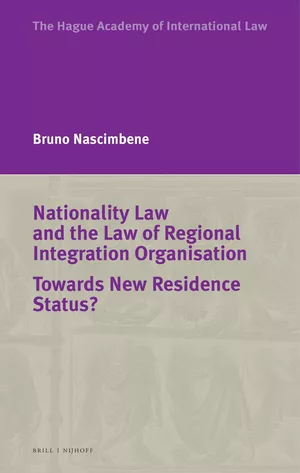Descrizione
Chapter I. The concept of nationality: Ongoing developments 19
1. The alien and non-membership: The citizen and nationality 19
2. The concepts of alien and citizen: A brief historical background . 21
3. The limits of the opposition between the two notions – The variety of intermediate categories of aliens: Residence and, in general, social ties with the national community 28
4. The concept of nationality and international human rights law: An evolving phenomenon 34
5. The international personality of the individual: Developments in international law and the limits to the recognition of personality . 36
Chapter II. Nationality and residence in the regional organisations: The European Union 40
Section A. The definition of European citizenship 40
1. Nationality and the regional integration organisations – The European Union: From European citizenship to “residential citizen- ship” 40
2. Origin and formation of European Union citizenship rules 41
3. Citizenship after the Treaty of Lisbon: a) Legal framework; b) Changes with regard to citizenship; c) Important rules 45
4. The beneficiaries of citizenship rights: Natural persons 48
5. Acquisition and loss of citizenship – The competences of the Union and the Member States: European citizenship as comple- mentary or additional to national citizenship 50
6. The case law of the Court of Justice on acquisition and loss of citizenship: The requirement of “additional” conditions as well as possession of the nationality of a Member State 52
7. Revocation of nationality and possible subsequent statelessness. . 56
8. The loss of EU citizenship as a consequence of Brexit 60
9. The right to one’s name: Power of the State and limits 68
10. Conclusions: a) The limits set by EU law; b) The prospects of harmonisation 73
Section B. Citizen status and “residential citizenship” 75
1. EU citizen status: The importance of residence and the extension of rights to third-country nationals 75
2. a) Rights and duties: The changes introduced by the Lisbon Treaty; b) The protection afforded by the Charter of Fundamental Rights 77
3. a) “Residential citizenship”; “civil citizenship”; b) Equal treatment, integration; c) Immigration and protection of fundamental rights. The different standard of treatment 84
4. Rules governing the rights of third-country nationals: The different categories of beneficiaries 89
5. Citizenship and residence rights: What the case law says 96
6. “Civil citizenship”: Concept and content – the importance of resi- dence 98
7. The standard of treatment of European citizens and third-country nationals: The case law of the Court of Justice: a) workers’ rights (welfare benefits); b) rights provided for in association agreements; c) right of residence; d) rights of spouses; e) rights of long-term residents 103
Chapter III. Nationality law and regional integration 112
Section A. The Council of Europe 112
1. Initiatives taken in the framework of the Council of Europe: Limits of applicability ratione personae – conventions concerning nationals of the Contracting States 112
2. Conventions that concern aliens: The Convention on Nationality – limits to the sovereignty of the State 116
3. The right to a nationality; the importance of residence: The outlook of the European Court of Human Rights 118
4. Acknowledgment of political rights and the importance of resi- dence: a) The Covenant on Civil and Political Rights; b) Other instruments 123
5. Conclusion to Section A 126
Section B. Regional organisations in South America 127
1. Forms of integration and the idea of a South American ciudadanía: Attention to social aspects; the protection of fundamental rights and the prohibition of discrimination on grounds of nationality 127
2. The Andean Community of Nations: a) The Latin-American common market and freedom of movement; b) The “Andean passport”; c) The Andean Labour Migration Instrument and equal treatment; d) Protection of family members and social rights; e) The Andean Migration Statute; f) Diplomatic and consular pro- tection; g) Human rights protection 131
3. Mercosur: a) Objectives; b) Freedom of movement; c) Social aspects and the protection of migrant workers; d) The right of resi- dence, the Brasilia agreements and the definition of a legal status for Mercosur nationals; e) Electoral law; f) Towards a Mercosur nationality status; g) Social rights and the right to vocational training; h) The limits of the initiatives taken and the subsequent results 138
4. The UNASUR crisis: Confirmation of the difficulty of moving towards an evolved form of integration between Latin American countries; a) Objectives of the Constitutive Treaty and recognition of fundamental rights; b) Institution of South American citizenship as a gradual integration objective 144
5. Conclusion to Section B 147
Section C. Regional organisations of Africa 147
1. The right to a nationality and free movement of persons in the African regional context: Some general remarks 147
2. A look at two of the African sub-regional integration processes that have paid most attention to the free movement of persons . . 151
(a) ECOWAS: Freedom of movement, residence and establish- ment – difficulties encountered 151
(b) SADC: Economic aims and freedom of movement of Member States’ nationals 154
3. Conclusion to Section C 156
Chapter IV. The notion of nationality and private international law: some brief remarks 157
1. The rise and fall of nationality as a connecting factor 157
2. The residence criterion 159
3. Current outlook 161
Chapter V. Conclusions 163
1. Limits to State sovereignty 163
2. Developments in nationality rights 163
3. The (possible) future of nationality rights 165
Bibliography 166


Recensioni
Ancora non ci sono recensioni.